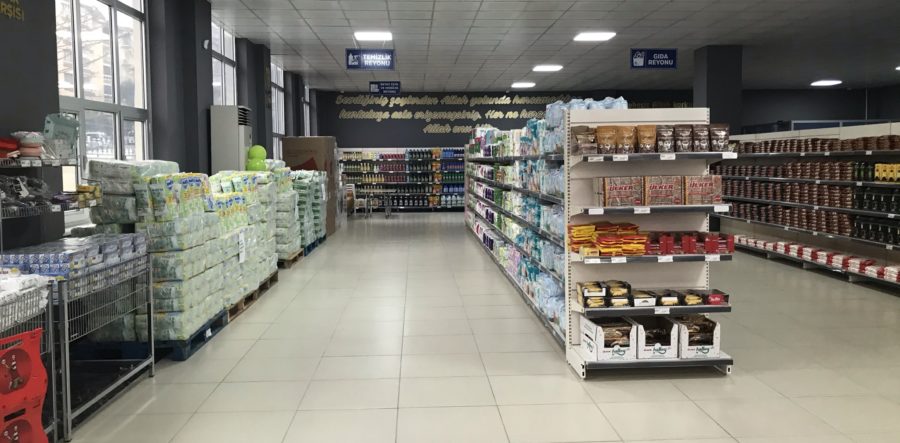
Basic Needs Association (Temel İhtiyaç Derneği-TİDER) received a grant from our Elazığ Earthquake Emergency Relief Fund in 2020 to support the establishment of two Support Markets in Malatya and Elazığ by collaborating with local stakeholders to serve people who were affected by the earthquake.
Read below our interview:
You completed the Establishment and Sustainability of Food Banks in Elazığ and Malatya provinces project. Can you tell us about the aim and activities of the project?
After the Elazığ – Malatya Earthquake in January 2020, part of our team went to Elazığ to support humanitarian aid efforts. We prepared a post-earthquake field coordination plan with the civil society organisations (CSOs) in the newly established Disaster Platform. As a CSO working in the field of food banking, we started our work in humanitarian aid activities and donation management, to meet basic needs. Since there were problems regarding the cold chain and the supply of food and hygiene products, food banks were vital. Following the completion of our field activities in Elazığ, we decided to work on establishing food banks in Elazığ and Malatya to support local organisations.
A month after our project started, the COVID-19 pandemic was declared. Although this was a great misfortune for us, we redesigned the project in a short time with the support of the Support Foundation for Civil Society team.
Since there were problems regarding the cold chain and the supply of food and hygiene products, food banks were vital.
Can you tell us about the collaborations you have established with this project? How will you ensure the continuation of these collaborations and the sustainability of the new food banks?
First, we collaborated with the Elazığ Municipality and the Elazığ Chamber of Commerce and Industry. Since we focused on local organisations in the further phases of the project, we decided to continue with the Kovancılar District Governorship Social Assistance and Solidarity Foundation (SYDV) as our project partner. Subsequently, we started food bank activities with the Kovancılar SYDV, which has a soup kitchen and a food warehouse. We initiated our project in Malatya with the Malatya Metropolitan Municipality. Within the scope of our project, we established the Vahap Küçük Charity Bazaar, one of the largest food banks in Turkey. We also shared an operation plan of the food bank, which is in market format, that can be organised in disasters, with the authorities.
To ensure the sustainability of our new food banks within the scope of this Fund, we wanted to provide support primarily with basic needs products. In six donation operations during the pandemic, we directed nearly 200 tons of donated products to both cities. We also want to organise trainings to strengthen the resource development and operational capabilities of our food banks here, as we do in other regions of Turkey.
In six donation operations during the pandemic, we directed nearly 200 tons of donated products to both cities.
What support do the food banks established in Elazığ and Malatya offer to the local people in the region, especially to those affected by the earthquake?
The food banking system is considered as one of the most effective ways of combating food waste and poverty. In this context, food banks in the region provide support for families to meet their basic needs. During disasters, food bank officials can provide ready-to-operate services in humanitarian aid processes that include donations of food, hygienic products, etc.
Malatya Metropolitan Municipality Vahap Küçük Charity Bazaar is a food bank in the form of a supermarket with food, hygiene, and clothing products, that gives families in need the opportunity to choose the product they want. On the other hand, Elazığ Kovancılar District Governorship’s food bank system, which serves as both a warehouse and a soup kitchen, delivers the donated products to specified families and provides hot meals to people in need.
How has the grant support contributed to your association?
The grant provided us with great support, especially for site detection activities, the supply of technical materials and basic needs for food banks. We want to thank the donors who supported this fund. We hope they’ll continue supporting our food banks to ensure the sustainability of this system, that is, food banks.
The food banking system is considered as one of the most effective ways of combating food waste and poverty.
Did you carry out any activities in the regions where wildfires occurred in July 2021? Considering that similar disasters may happen soon, does TIDER have any plans to work on this issue?
We carried out needs assessment activities in Manavgat, managed donations in 2 warehouses in Marmaris, and supported the soup kitchen in Isparta following the wildfires. In the coming period, we want to organise food banking activities in these regions to meet the needs of the local people. Fires are more difficult to manage than other disasters; thus, the management of technical equipment donations, as well as humanitarian aid, is very important. As TİDER, we will try to improve our capacity in managing the technical equipment donations and meet the demands of the field teams for any fire disaster that may occur.
About TİDER
TİDER works to ensure that all people can meet their basic needs in a fair and equal manner and uses the food banking model as a crucial tool in combating hunger, poverty and waste prevention. TİDER also works with the beneficiaries to help them access jobs compatible with their abilities.



